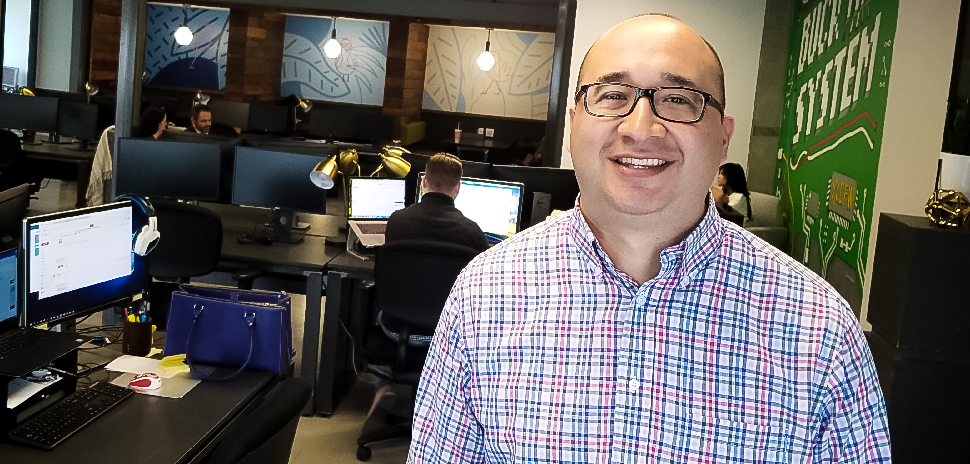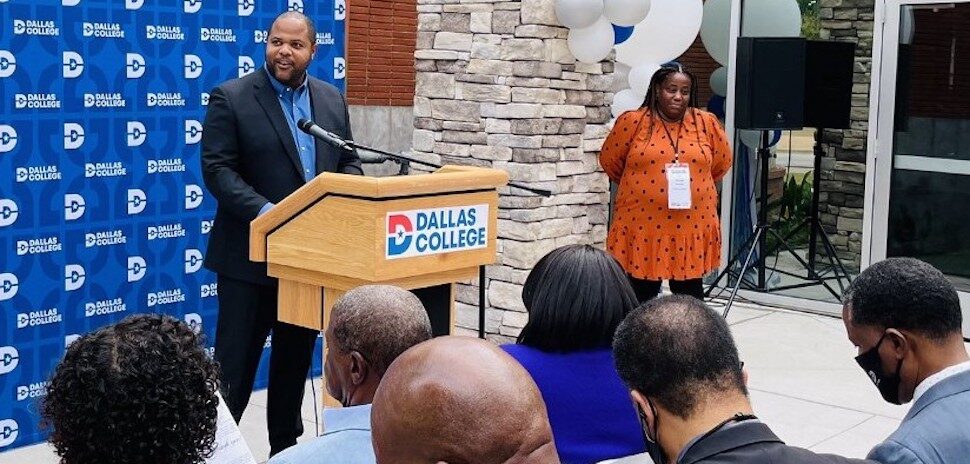Walmart is counting on a team of engineers in Plano to help associates at the world’s largest retailer operate its more than 5,000 stores more efficiently.
Carlos Riojas is a Waco native and Baylor University grad who runs the Walmart Technology office in Plano and leads the team that builds digital and analytical solutions to enable operations to run smoother.
Plano and Austin are home to the second and third Walmart Technology operations in existence. Walmart Technology focuses on helping associates in key internal areas, including global risk compliance, human resources, finance, and oil and gas acquisitions.
Currently, Walmart is seeking more employees to fill vacancies at its technology offices. As of March 30, 18 of 45 positions had been filled.
Riojas talked recently with Dallas Innovates about how the retailer is using data, improving operational efficiency at its retail stories, and why it choose North Texas to locate one of its first Walmart Technology offices outside Bentonville, Arkansas.
Sounds like Walmart has accrued a large volume of data, and it’s now starting to sift through what it’s got, to improve operational efficiencies.
I want to make clear that [retail-centric] Walmart Labs, and Walmart in general (before it was called Walmart Labs), has always done a great job of harvesting its retail data, its sales data. Sharing it with vendors, making good decisions, and that’s kind of what’s helped Walmart get ahead as a retailer. On the retail side, we’ve been in that business for a long time. I think now, looking at our internal operations is a key to continued success at Walmart.
How can this data work for Walmart?
In general, there are a lot of things that Walmart does well, and we have really great associates in our headquarters and I think what we’re looking to do is get them the right analytics, and the right insights, at the right time, so that they can become even more efficient at what they’re doing.
We feel some of the stuff we do around AI will help point out things that are important to take action on faster.
An associate on their own is not able to traverse the amount of data that they see on a daily basis, whether it be emails or audits of invoices, [these] are all those areas that we talked about earlier [global risk compliance, human resources, finance, and oil and gas acquisitions]. We feel some of the stuff we do around AI will help point out things that are important to take action on faster.
Would you be able to provide some specific examples of how this works?
One that we will take a look at, on the IoT side, is managing energy consumption at all the stores. So, in that case, streaming the IoT, understanding the data that’s coming, doing some analytics on it, and controlling the optimal use of energy within the stores. Being able to get those insights to our customer that controls energy and owns the budget for energy for Walmart is a big deal to our bottom line.
A lot of companies in the Dallas are doing artificial intelligence and big data analysis.
The difference is, the big companies are the ones who have the value, because they have the data. You can be a startup that does artificial intelligence, but guess what: If you don’t have data, you just have a bunch of cool people walking around. What they’re trying to do is, find big companies with big data. They’re consulting services, so that makes sense. I think for us, it’s important to keep it with associates, so that we keep the patents and IP, and that’s a big portion of what we’re trying to do here in Austin and in Dallas.
Could you describe the role computer vision might play in store operations?
Walmart has a lot of cameras in their stores. How do we utilize existing assets, with some of the newer technologies coming, to help the stores? We felt like one example would be using existing assets there. [For example,] the produce aisle to identify when you know maybe fruit has fallen to proactively give alerts [to associates]. And that’s challenging, right? It’s a good problem for people in [the field of] computer vision to solve.
[If] I have a brand-new box with these high-tech cameras … that’s not as challenging as using existing cameras … which may be grainy, in different angles, in 5,000 stores. We’re looking for people who want to solve those problems. These are just proactive ways to help them run their store more efficiently. So they can spend more time on customer service.
Could you discuss the role computer science might play in invoicing?
Conceptually, if you think of the volume that Walmart does, we have tons of invoices, and in an invoicing three-way match is a big deal. The accuracy of matching invoice for payment as very important. Walmart has always done that actually really well compared to the industry. Every little percentage point you can get that more accurate with some of the newer technologies is value-added.
How many Walmart tech/innovation/incubators are there?
Walmart Labs has an office in Sunnyvale, California, Reston, Virgina, and a large portion of their associates are in Bentonville, Arkansas. Walmart also has an innovation incubator called Store No 8 in California. The majority of our [Walmart Technology] associates are in Bentonville, Arkansas. Dallas and Austin are our first Walmart Technology offices outside of Bentonville.
So, why did you locate Walmart Technology offices in Dallas and Austin? There are other places with more people.
A couple reasons: We were having success recruiting from UT Dallas to Bentonville, so that caught our attention. We were recruiting at several universities across the nation, and we had more hires from UTD than any other university, in computer science. It was a good culture fit between the university and Walmart.
We had more hires from UTD than any other university, in computer science.
The other thing is that Walmart has been in Dallas since the 1970s. We opened our first store in Texas in the 1970s, and Dallas … has more supercenters than any other metro area in the U.S. So, it’s already home, right?
It’s only a five-and-a-half-hour drive [from Bentonville]. It makes sense as a natural extension from the home office. And in the Austin office … it’s known as a tech hub, and we already had somebody down there who’s opening an office.
How stiff has competition been, hiring in North Texas, given the increase in the Dallas area’s tech economy?
We’ve been hiring in the last five or six months, and we feel that locally, we’re able to compete with those companies with what we offer, and the type of work that we do. So, a lot of great technologists are more into the mastery than anything, and so they want to sharpen their skills and Walmart has a unique proposition because we have the use cases and the large data that a lot of other companies just don’t offer.
Where have your recruits come from for the Plano office?
Mostly local. We’ve hired from Palo Alto. We moved one from Seattle. And one from North Carolina.
How hard has it been to find the talent locally?
I’d say it’s on trend with the industry. You can find a lot of resumes and find decent talent, but I think our bar is set pretty high here. We’re looking for exceptional talent and that does take longer to find. I’d say 1 out of 10 that we interview we probably have hired so far.
What do you look at, when you hire?
It’s different from each side. From a data scientist/machine learning engineer [perspective], I think we look at how large the data they have dealt with, probably plays more of a factor there. Not just to look at data and fit into this large organization, but they have an engineering mindset, to play with different tools, so they are able to, play with different tools, assess different things, maybe do some research, read papers. We’re looking for that type.
A lot of the initial hires we’ve made have come from smaller companies, where they’re used to defining what success looks like on their own.
That’s why it’s a little harder to find the right [people]. It’s not, ‘Hey, we’re looking for a data scientist who can work with big organizations,’ but [individuals who will] help define where we want to go. A lot of the initial hires we’ve made have come from smaller companies, where they’re used to defining what success looks like on their own.
More self-determining?
More curious. Curiousity is a good [description]. Not that I want to give away our secrets, but one of the key questions we might ask a candidate is, “What do you do, after your job?” It tells a lot about a person. Like, are they trying to learn the next technology coming out? Or do they just they do their job and they go home and they don’t think about technology at all.
We’re looking for those curious people that are trying to stay on trend.
Why is Walmart promoting this venture? Surely, people in the industry know about it by now. It’s a tight-knit community.
When people hear that Walmart is hiring, it’s not known in the industry like a Google or a Facebook. So, some of this is letting them see that Walmart Technology is an innovation company. Because it is. Some of it is recruiting. Not everyone goes to meetups. People are in different parts of their careers. Especially professional hires. They may or may not go. So, we’re talking to Dallas AI. We may host meetups here. Or become speakers at some panels.
Get on the list.
Dallas Innovates, every day.
Sign up here to get what’s new and next in Dallas-Fort Worth.





































































